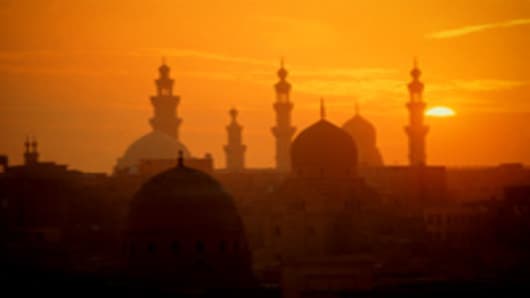Amr Moussa,one of Egypt’s top presidential candidates, has reiterated his belief in free markets and told CNBC that the country needed to “open up.”
"I believe in a free market economy, and we need to open that up and we will take all necessary measures to put that effect," said Moussa, a political independent.
With the Muslim Brotherhood’s political wing, the Freedom and Justice Party (FJP), dominating parliament, fears have been growing that economic policy could take on a more conservative Islamist track.
Some 15 months after the fall of Hosni Mubarak, Egyptians will votein the country’s first free presidential election on Wednesday and Thursday. The result of the first round will be announced on May 29, with a run-off slated for June should no candidate secure at least fifty percent of votes.
Egypt’s economy has taken a major hit since the revolution last year, with economic growth expected to slow to just 1.5 percent this year, according to the International Monetary Fund (IMF). The recent government budget draft targeted 4 to 4.5 percent in the coming fiscal year, but some candidates have claimed as much as 10 percent was achievable.
“Well, realistic is developing two to three percent as quickly as possible, talking about 10 percent I don't think it is practical, but it could be achieved in the next decade,” Moussa said.
Moussa however shrugged off concerns about delays in reaching an agreement for a much-needed $3.2 billion loan from the IMF to finance the budget deficitand reduce pressure on foreign currency reserves. Once elected, Moussa would consider the IMF negotiations a priority, and was confident a deal could be signed within one or two months.
“It will be done. It has to be done,” he explained.
Although pre-election surveys have changed frequently, Moussa was consistently among the leading candidates. The 76-year-old is well-known in international circles as a statesman, following a decade as Secretary General of the League of Arab States. He also served as Foreign Minister from 1991-2001 under former President Hosni Mubarak.
When CNBC last spoke to him before the revolutionhe made no secret of his presidentialambitions.
Moussa’s recipe for bringing the economy back on track was simple: Reestablish national security. That he said, would help boost revenues from tourism, remittances from abroad and foreign direct investment (FDI).
“Security will have to be re-established, reintroduced very quickly in order to send a clear message to the population of Egypt that Egypt is coming back to normal," Moussa said. "When the Egyptian citizen feels secure, this will open the door for tourism investments”.



